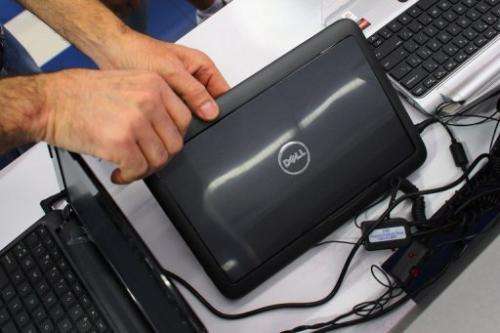Dell faces key shareholder vote on go-private plan

With a critical vote looming on a private equity buyout for Dell, it has become clear the struggling computer giant faces a tough road as it tries to revive its fortunes.
Dell shareholders are set to vote Thursday on the $24.4 billion buyout plan, which would take Dell private and allow founder Michael Dell to restructure the company without the pressures of a publicly traded firm.
The plan has been endorsed by the prominent proxy advisory firm Institutional Shareholder Services, but several stakeholders are opposing the buyout and corporate raider Carl Icahn has been waging a campaign to derail it.
Some reports say the vote is likely to be close, and that Dell may delay the vote if it lacks a majority. But in any case, Dell faces a rocky future.
"I expect the deal to go through, and if it does I would expect Michael Dell to make changes rapidly," said Roger Kay, analyst at Endpoint Technologies Associates.
"Those changes are likely to involve slimming down some of the existing business and investment in some areas of promise."
As a private company, Dell would be less profitable for a time but could reorganize with a longer view in mind, said Boston University professor of management N. Venkatraman.
"There is a part of me that feels Dell might have missed the boat," said Venkatraman.
"They missed the whole mobile device shift. Then they went after the enterprise market but that is fickle too."
Still Venkatraman said Dell still has a strong brand name and can get back on track.
"I think the post-PC market shift will take a decade to play out, but Dell needs to play its cards right," he said.
He added that Dell, which has lost its advantage of using the supply chain to make PCs to order, "needs to figure out what its role is in the post-PC world, or it will become another BlackBerry."
Jack Gold, analyst at J. Gold Associates, agreed that Dell needs some dramatic moves.
"If the vote goes against the buyout, I think Dell would have a much tougher time making the changes it needs to make in order to get back in the game in a big way," Gold said.
"Dell needs to re-invent itself as the market around it has dramatically shifted. The best way for it to do so would be for it to forgo the short term and often irrational oversight of being a public company."
Dell, once the world's biggest PC seller, has fallen behind rivals Lenovo and Hewlett-Packard and faces pressure because of slumping computer sales. A recent survey showed worldwide sales of personal computers dropped for a fifth consecutive quarter in the April-June period.
Dell has failed in smartphones and tablets, but has seen some success in software and business services through its acquisitions.
Some shareholders have said the buyout which sets a price of $13.65 dollars a share undervalues Dell and have rallied around Icahn's effort to find an alternate plan.
Icahn said in an open letter to shareholders Monday that Dell's board "has shamelessly attempted to frighten stockholders throughout this process" by highlighting the problems of the PC sector and reduced profitability.
"But the scary facts they bring up are often the result of Dell's own actions," Icahn said.
Icahn has proposed a price of $14 per share for up to 71 percent of Dell stock, and recently sweetened the deal by adding one warrant for every four Dell shares, entitling the holder to one share of Dell at $20.
Icahn is backed by the investment firm Southeastern Asset Management. And another financial firm, T. Rowe Price, has also indicated it would oppose the buyout.
"We continue to believe the proposed buyout does not reflect the value of Dell and we do not intend to support the offer as put forward," T. Rowe Price chairman and chief investment officer Brian Rogers said.
Yet some analysts say there is little alternative to the buyout and that Icahn has neither the finances nor the vision to turn Dell around.
"He doesn't know how to run a tech company, he doesn't have the first clue," Kay said, adding that an Icahn-run Dell would be "bad for customers, partners, and employees."
"I think he would pay off his partners, paying fees to investment banks to get back some of what they invest. You would see a chopping up of the company and the destruction of Dell."
© 2013 AFP


















